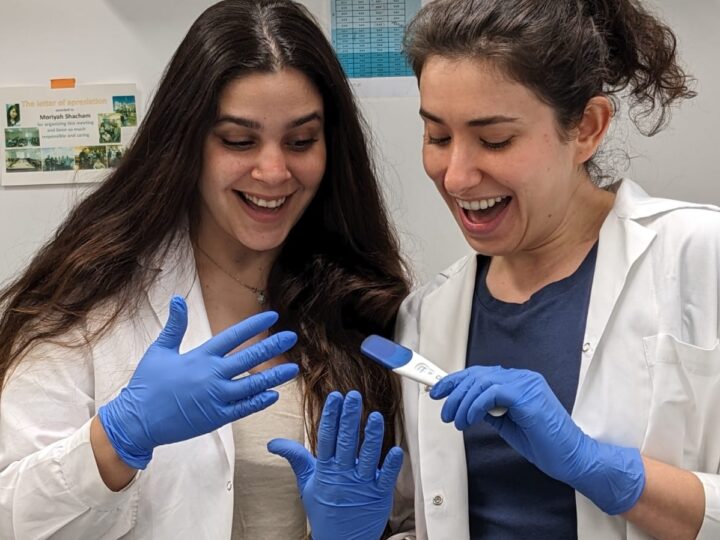Women who have had more than one child know that each subsequent pregnancy tends to be easier than the first. But physicians and scientists never knew why. Now, Israeli researchers at Hadassah Hebrew University Medical Center in Jerusalem may have cracked this long-perplexing childbirth code.
The answer plays out like a detective thriller, with twists and turns and an unexpected role reversal where the bad guy goes good and saves the day.
Even the name of the key biology involved supports the thriller motif: the researchers, led by Prof. Simcha Yagel, head of OB/GYN at Hadassah, have been studying “natural killer cells.”
Part of the body’s immune system, natural killer cells get their swashbuckling name from their ability to wipe out tumors and pathogen-infected cells. These same natural killer cells are abundant in the human decidua – the lining of the uterus that forms the maternal part of the placenta during pregnancy.
Natural killer cells help protect the embryo and ensure its development, although they also can cause problems and have been linked in previous research with recurrent miscarriage.
That’s because “a fetus is essentially a parasite or a tumor,” Yagel tells ISRAEL21c. “It’s invaded a mother’s tissue. It gets oxygen and nutrients from the mother.”
Most of the time, the natural killer cells hew to their main immune function. Still, Yagel notes that “70 percent of the cells in the fetal-maternal interface are natural killer cells. That’s too much for just immune protection.”
What else could these natural killer cells be doing? As Yagel and his team continued their research, they discovered that, rather than kill, so-called natural killer cells actually improve the chances of a healthy child “by producing proteins that support the pregnancy.”
The mechanism is complex, but the result is, “We shouldn’t call them natural killer cells. We should call them ‘natural builder cells,’” Yagel says.
Cells that remember
The most surprising twist: natural killer cells have memory.
This had already been shown in an earlier study looking at how these cells fight disease. For example, when attacking the CMV virus, natural killer cells get better at their job the second and third time they encounter the virus. “Without memory, they [would] attack everything that looks foreign,” Yagel says.
Yagel and his team found that the same thing was happening with his “natural builder” cells in pregnancies beyond the first one. In particular, they improved “placentation” – the formation or arrangement of the placenta.
“Our findings may provide an explanation as to why complications of pregnancy are less frequent in repeated pregnancies.”
That may help explain why the frequency of developing preeclampsia, a condition marked by high blood pressure and swelling in the feet, legs and hands, and that can result from inadequate placentation, drops in subsequent pregnancies.
“The chance of having severe preeclampsia in a first pregnancy is 2-3 percent worldwide,” Yagel says. “Statistically, that’s a lot. It can be fatal for the fetus or cause neurological deficits. And it can do significant harm to the mother.”
“Our findings may provide an explanation as to why complications of pregnancy, especially the ‘great obstetrical syndromes’ [which include intrauterine growth restriction and small birth size] … are less frequent in repeated pregnancies,” the researchers wrote in their paper, which was published in May 2018 in the medical journal Immunity.
Screening test could be developed
Yagel’s research fits into the area of biology called “epigenetics,” which studies the changes in an organism caused by modification of gene expression.
“We discovered a population [of natural killer cells] found in repeated pregnancies which has a unique transcriptome and epigenetic signature,” the researchers added. “We named these cells Pregnancy Trained Decidual Natural Killer Cells.” (“PTdNK” for short.)
Yagel stresses that the research is still early phase. We don’t know yet, for example, how to turn on the pregnancy-enhancing function of natural killer cells in first pregnancies.
The ultimate goal “is to develop a test to screen for risk factors,” Yagel tells ISRAEL21c. By understanding how natural killer cells work, “we can ask what’s missing in first pregnancies and eventually give some treatment.”
One possibility the researchers suggest: artificial expansion or manipulation of natural killer cells during a woman’s menstrual cycle prior to pregnancy. That’s possible because natural killer cells with their “memory” function accumulate in menstrual blood.
“The cells seem to be ‘waiting’ for the next pregnancy,” Yagel says.
Moriya Gamliel, who did most of the heavy lifting for the current research as part of her PhD thesis and is the lead author of the article in Immunity, holds out a tantalizing direction for future research.
“We will try to convert the precursors of these memory natural killer cells — which are found in the uterus between pregnancies — into fully functional ‘memory’ cells that can theoretically be used to treat cases with poor placenta development or even diseases outside of pregnancy,” Gamliel explains.
That said, “What we’ve done so far is not sufficient to make commercial tests,” Yagel adds, and there’s much more work for Yagel, Gamliel and the team to do.
The just-completed study took six years of painstaking work, including analyzing tissue samples from more than 450 pregnancies.
We asked Gamliel what she felt were the most surprising results of the research. “That this finding is independent of epidemiological data such as maternal age or weeks of pregnancy,” she tells ISRAEL21c. “It doesn’t even require reaching full term in previous pregnancies.”
As long as the pregnancy lasted through the first trimester, “you still have these memory cells.”
Other team members in the project came from across departments at the Hebrew University, including the Foundation Laboratories at the Lautenberg Centre for Immunology and Cancer Research, the Magda and Richard Hoffman Center for Human Placenta Research, the Department of Obstetrics and Gynecology, and the Department of Developmental Biology and Cancer Research. Additional research support was provided by the Department of Molecular Genetics and the Department of Immunology at the Weizmann Institute of Science in Rehovot.

















